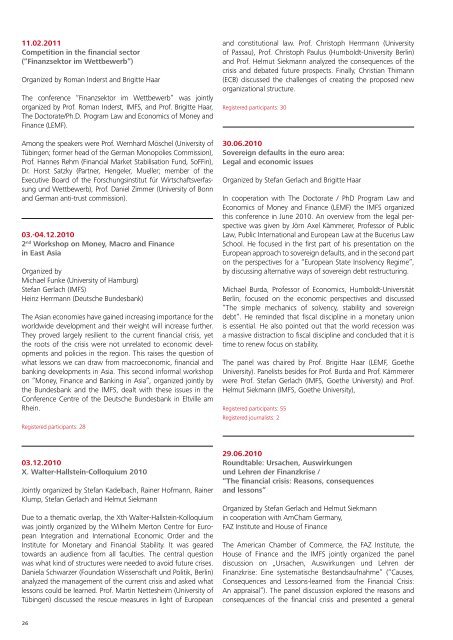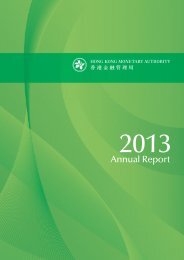IMFS_2009_to_2013_web
IMFS_2009_to_2013_web
IMFS_2009_to_2013_web
Create successful ePaper yourself
Turn your PDF publications into a flip-book with our unique Google optimized e-Paper software.
11.02.2011<br />
Competition in the financial sec<strong>to</strong>r<br />
(“Finanzsek<strong>to</strong>r im Wettbewerb”)<br />
Organized by Roman Inderst and Brigitte Haar<br />
The conference “Finanzsek<strong>to</strong>r im Wettbewerb” was jointly<br />
organized by Prof. Roman Inderst, <strong>IMFS</strong>, and Prof. Brigitte Haar,<br />
The Doc<strong>to</strong>rate/Ph.D. Program Law and Economics of Money and<br />
Finance (LEMF).<br />
Among the speakers were Prof. Wernhard Möschel (University of<br />
Tübingen; former head of the German Monopolies Commission),<br />
Prof. Hannes Rehm (Financial Market Stabilisation Fund, SoFFin),<br />
Dr. Horst Satzky (Partner, Hengeler, Mueller; member of the<br />
Executive Board of the Forschungsinstitut für Wirtschaftsverfassung<br />
und Wettbewerb), Prof. Daniel Zimmer (University of Bonn<br />
and German anti-trust commission).<br />
03.-04.12.2010<br />
2 nd Workshop on Money, Macro and Finance<br />
in East Asia<br />
Organized by<br />
Michael Funke (University of Hamburg)<br />
Stefan Gerlach (<strong>IMFS</strong>)<br />
Heinz Herrmann (Deutsche Bundesbank)<br />
The Asian economies have gained increasing importance for the<br />
worldwide development and their weight will increase further.<br />
They proved largely resilient <strong>to</strong> the current financial crisis, yet<br />
the roots of the crisis were not unrelated <strong>to</strong> economic developments<br />
and policies in the region. This raises the question of<br />
what lessons we can draw from macroeconomic, financial and<br />
banking developments in Asia. This second informal workshop<br />
on “Money, Finance and Banking in Asia”, organized jointly by<br />
the Bundesbank and the <strong>IMFS</strong>, dealt with these issues in the<br />
Conference Centre of the Deutsche Bundesbank in Eltville am<br />
Rhein.<br />
Registered participants: 28<br />
and constitutional law. Prof. Chris<strong>to</strong>ph Herrmann (University<br />
of Passau), Prof. Chris<strong>to</strong>ph Paulus (Humboldt-University Berlin)<br />
and Prof. Helmut Siekmann analyzed the consequences of the<br />
crisis and debated future prospects. Finally, Christian Thimann<br />
(ECB) discussed the challenges of creating the proposed new<br />
organizational structure.<br />
Registered participants: 30<br />
30.06.2010<br />
Sovereign defaults in the euro area:<br />
Legal and economic issues<br />
Organized by Stefan Gerlach and Brigitte Haar<br />
In cooperation with The Doc<strong>to</strong>rate / PhD Program Law and<br />
Economics of Money and Finance (LEMF) the <strong>IMFS</strong> organized<br />
this conference in June 2010. An overview from the legal perspective<br />
was given by Jörn Axel Kämmerer, Professor of Public<br />
Law, Public International and European Law at the Bucerius Law<br />
School. He focused in the first part of his presentation on the<br />
European approach <strong>to</strong> sovereign defaults, and in the second part<br />
on the perspectives for a “European State Insolvency Regime”,<br />
by discussing alternative ways of sovereign debt restructuring.<br />
Michael Burda, Professor of Economics, Humboldt-Universität<br />
Berlin, focused on the economic perspectives and discussed<br />
“The simple mechanics of solvency, stability and sovereign<br />
debt”. He reminded that fiscal discipline in a monetary union<br />
is essential. He also pointed out that the world recession was<br />
a massive distraction <strong>to</strong> fiscal discipline and concluded that it is<br />
time <strong>to</strong> renew focus on stability.<br />
The panel was chaired by Prof. Brigitte Haar (LEMF, Goethe<br />
University). Panelists besides for Prof. Burda and Prof. Kämmerer<br />
were Prof. Stefan Gerlach (<strong>IMFS</strong>, Goethe University) and Prof.<br />
Helmut Siekmann (<strong>IMFS</strong>, Goethe University),<br />
Registered participants: 55<br />
Registered journalists: 2<br />
03.12.2010<br />
X. Walter-Hallstein-Colloquium 2010<br />
Jointly organized by Stefan Kadelbach, Rainer Hofmann, Rainer<br />
Klump, Stefan Gerlach and Helmut Siekmann<br />
Due <strong>to</strong> a thematic overlap, the Xth Walter-Hallstein-Kolloquium<br />
was jointly organized by the Wilhelm Mer<strong>to</strong>n Centre for European<br />
Integration and International Economic Order and the<br />
Institute for Monetary and Financial Stability. It was geared<br />
<strong>to</strong>wards an audience from all faculties. The central question<br />
was what kind of structures were needed <strong>to</strong> avoid future crises.<br />
Daniela Schwarzer (Foundation Wissenschaft und Politik, Berlin)<br />
analyzed the management of the current crisis and asked what<br />
lessons could be learned. Prof. Martin Nettesheim (University of<br />
Tübingen) discussed the rescue measures in light of European<br />
29.06.2010<br />
Roundtable: Ursachen, Auswirkungen<br />
und Lehren der Finanzkrise /<br />
“The financial crisis: Reasons, consequences<br />
and lessons”<br />
Organized by Stefan Gerlach and Helmut Siekmann<br />
in cooperation with AmCham Germany,<br />
FAZ Institute and House of Finance<br />
The American Chamber of Commerce, the FAZ Institute, the<br />
House of Finance and the <strong>IMFS</strong> jointly organized the panel<br />
discussion on „Ursachen, Auswirkungen und Lehren der<br />
Finanzkrise: Eine systematische Bestandsaufnahme” (“Causes,<br />
Consequences and Lessons-learned from the Financial Crisis:<br />
An appraisal”). The panel discussion explored the reasons and<br />
consequences of the financial crisis and presented a general<br />
26



